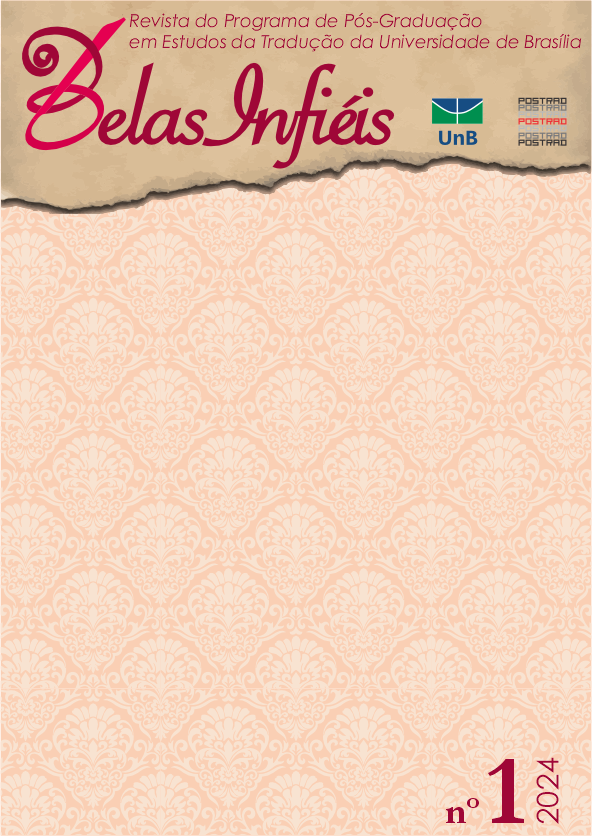Resenha de Translation: the basics de Juliane House
DOI:
https://doi.org/10.26512/belasinfieis.v13.n1.2024.53280Palabras clave:
Estudos da Tradução. Traduzibilidade. Globalização.Resumen
A obra Translation: the basics de Juliane House é uma introdução acessível aos Estudos de Tradução, abrangendo questões essenciais nessa área. Dividido em quatro partes, o livro explora tópicos como a natureza da tradução, as competências necessárias aos tradutores, a influência da cultura e da ideologia na tradução e a evolução histórica da prática. A segunda parte aborda conceitos teóricos, como traduzibilidade, equivalência e critérios de qualidade. A autora apresenta seu próprio modelo de avaliação e discute o uso de corpora na pesquisa de tradução. Na terceira parte, House explora novas tendências nos estudos de tradução, como a compreensão do processo mental dos tradutores e o impacto da tecnologia digital e da globalização. A última parte concentra-se nos papéis da tradução em contextos do mundo real, incluindo situações profissionais e educacionais. A autora discute questões éticas e o crescente envolvimento de pessoas comuns em atividades de tradução.
Descargas
Citas
House, J. (2024). Translation: the basics (2. ed.). Routledge.
Jakobson, R. (1959). On Linguistic Aspects of Translation. In R. Brower (ed.), On Translation (pp. 232-239). Oxford University Press.
Koskinen, K. (2000). Institutional Illusions: Translating in the EU Commission. The Translator, 6(1), 49-65. https://doi.org/10.1080/13556509.2000.10799055
Munday, J. (2014). Using Primary Sources to Produce a Microhistory of Translators and Translations. The Translator, 20(1), 64-80. https://doi.org/10.1080/13556509.2014.899094
Sperber, D. (1996). Explaining Culture. Blackwell.
Descargas
Publicado
Cómo citar
Número
Sección
Licencia
Derechos de autor 2024 CC BY

Esta obra está bajo una licencia internacional Creative Commons Atribución 4.0.
Copyright Statement
Given the public access to this journal, the texts are free to use but requires the recognition of the original authorship and initial publication in this journal to be properly stated.
The journal allows the use of works published for non-commercial purposes, including the right to submit the work to publicly accessible databases. Published contributions are the sole and exclusive responsibility of the author(s).
- When submitting papers to be evaluated by the Belas Infiéis journal, the author(s):
- Declare that the contents of the contributions are original and of their original creation, being entirely responsible for their content if there is an objection by third parties.
- Claim to be aware that they should not commit academic plagiarism.
- Declare that the manuscript has not been published, completely or partially, in Portuguese or another language. If it is a translation it should be submitted to the Translated Articles section.
- Declare that the manuscript is not being evaluated by other journals.
- Declare that the manuscript was not submitted to another journal simultaneously.
- Commit(s) to inform the journal of any kind of error or inaccuracy in their contribution (published, in evaluation or in editing) and to collaborate with the editors to make due corrections of the article (when in evaluation or editing) or erratum/retraction (after publication).
- Declare that there is no conflict of interest regarding the published work.
- Authorize its release if it is accepted for publication without any kind of monetary compensation.
- Agree to assign non-exclusive rights to publication to the magazine, remaining free to make their contribution available in other media as long as the publication of the first version in Belas Infiéis magazine is mentioned. They also authorize Belas Infiéis to assign their texts for reproduction in content indexers, virtual libraries and similar platforms.
- Maintain copyright and grant the journal the right of first publication, the work being licensed under theCreative Commons Attribution License.
- Is/Are allowed and encouraged to publish and distribute their work online after the editorial process, which may increase the impact and citation of the published work.
- Authorize the editorial team to make textual adjustments and to adapt the article to the publication rules, when necessary.



















